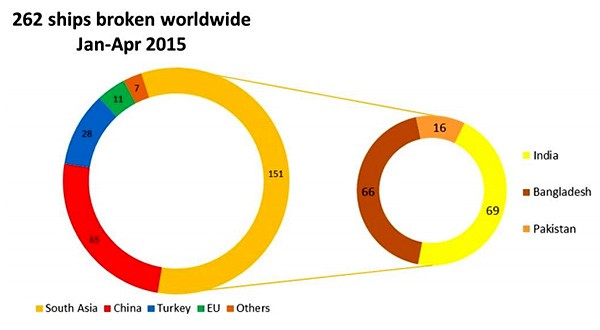The NGO Shipbreaking Platform has issued its 5th South Asia Quarterly Update which revolves around data and information regarding the shipbreaking industry in Pakistan, Bangladesh and India.
The Platform focuses on providing the public with information regarding both the negative effects of shipbreaking practices that are not up to the necessary standards and positive steps forward concerning various accomplishments in the areas of environmental justice and worker rights protection. The Platform is able to do exactly this by giving a thorough and consistent overview of various accidents, vessels broken on South Asian beaches, recent political, on-the-ground and legislative developments etc.

In the fifth edition of the Shipbreaking Platform’s update there is plenty of information on various important topics such as recent cases involving workers being killed or sustaining serious injuries while working at shipbreaking yards. 27-year-old Arif suffocated to death back in April of 2014 while cleaning a beached ship’s tank. 35-year-old Nezamuddin was involved in a grave accident involving a wire used to pull parts off a broken vessel that broke loose and slashed Nezamuddin’s back resulting in him being permanently disabled – the accident occurred 8 years ago on a Bangladesh beach. Muhammad Selim, married with 3 children, passed away in November of 2014 due to injuries he had previously sustained in July of 2013 while completing his daily duties in a Chittagong shipyard. 27-year-old Prasant Dakua lost his life while working on a beached ship in Alang, which had formerly been property of a German company.
Current statistics for the year show that 262 large commercial ships in total have been sold in order to be broken down, and that includes 151 end-of-life vessels that were beached in South Asia. The larger portion of them is going to end up in Mumbai or Alang in India (69 vessels in total) and Chittagong in Bangladesh (a total of 66 vessels). Just 16 end-of-life ships have been reportedly sold to Pakistan thus far. When we add up all the numbers together it becomes evident that these three South Asian countries account for 58% of the total number of vessels scrapped in Q1 of 2015.
Source & Image: NGO Shipbreaking Platform